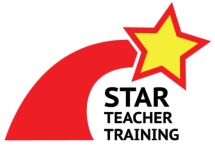If you think back, a lot of games we played as children were short-term memory challenges. These kinds of games are inherently interesting for kids and they’re also great for the English classroom. One great example is Magic Eyes. It’s a quick and easy-to-implement EFL memory activity for both large primary and preschool classes.
How to Play Magic Eyes
This EFL memory activity goes great early in the lesson soon after you’ve presented the vocabulary and you want your students to repeat it as a class. It also works great as a review of older vocabulary.
First put a set of about six flashcards on the board in a line with magnets or blue-tack.
Next, point and say the words in order with your students silently listening. Then go through again with the class another time (or even a second) so they get familiar.
Once they’re ready, it’s time to remove or turn over a one of the flashcards. Point to the empty space and ask students what was there. Then go through all the words in order together again.
After that first round you can remove one or two flashcards each round for a few rounds until all the cards are missing and students are doing it all from memory.
Finally, if you don’t have flashcards, you can do this by drawing or writing the vocabulary on the board. You can then cover up each item with paper held up with Blu Tack or magnets.

Extra EFL Memory Activity Tips
Funny & Faster: As the students get better you can encourage them to go faster and faster. You can also get them to chant in funny monster, pirate, or robot voices. Reading them all out with emotions (sad, angry, excited, etc) is also really engaging and useful for little students.
On Their Own: You can also stop saying the words and let the students do it all on their own after a round or two. This will save your voice and let you hear the students better.
Rhythmic Chanting: It’s a good idea to organize the vocabulary in a rhythmic pattern. This helps with flow and students enjoy it more.
Below, you can see Carol Read presenting the activity. She’s using (zebra), tiger, elephant, ostrich, whale, giraffe.
Related Post: EFL Chanting is Fun for Kids. It’s True!
Muah Ha Ha! I like to cackle and act like a bad guy or monster as I take down each flashcard. My Grade 1 students loved to squeal “No, monster! No!” between each round. Small things like this liven up the activity even more.
Chunks & Sentences: You don’t have to do stick to just vocabulary flashcards with Magic Memory, either. You can use this game with language chunks like:
“eat an apple, eat a pear, eat some grapes and eat an orange, drink some milk and drink some juice”
Or you can even write up a whole sentence on the board. Children can read out the sentence and then you erase and replace words with underlines.
- “There is a happy yellow monkey in the tall tree.”
- “There is a happy ________ monkey in the tall ______.”…
What other memory games do you use in your lessons? As always, please like, share and comment below.






